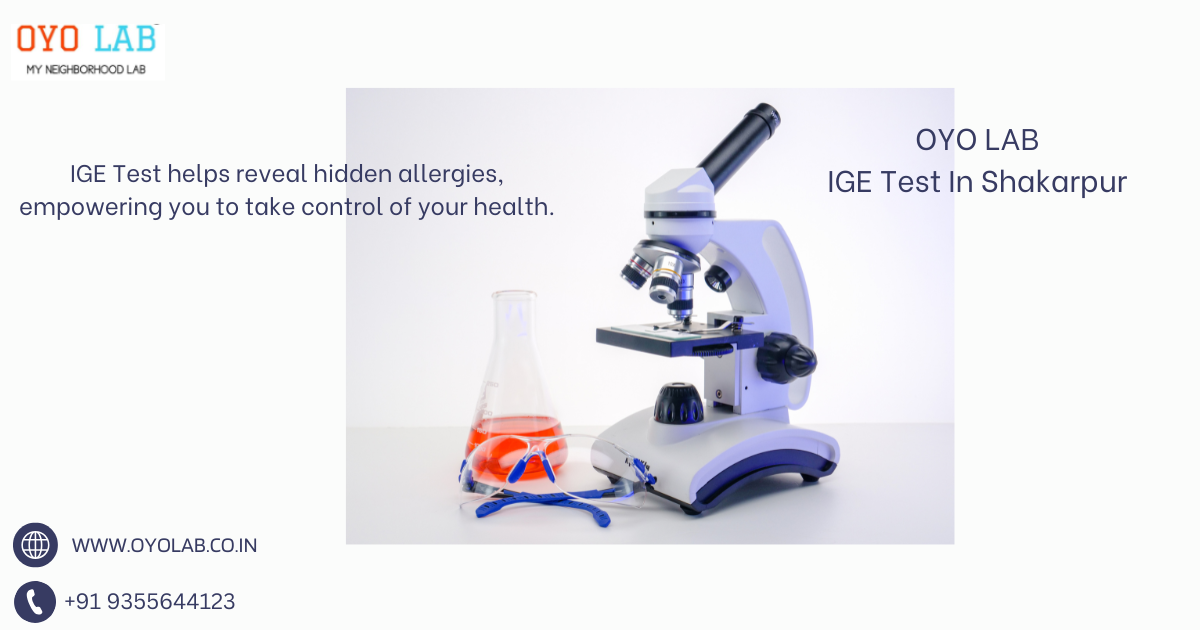
IGE Test In Shakarpur
By Shilpa | March 25, 2025
What Is IGE Test ?
An IGE (Immunoglobulin E) Test is a blood test that measures the level of IGE antibodies in your body. These antibodies are produced by the immune system in response to allergens such as pollen, pet dander, certain foods, or insect stings.
Why Is It Done?
Doctors use the IGE test to:
-
Diagnose allergic reactions (food, environmental, or insect allergies).
-
Identify asthma triggers and other allergic conditions.
-
Detect parasite infections (since IGE levels can rise in response to some infections).
-
Evaluate immune system disorders related to high or low IGE levels.
Types of IGE Tests
-
Total IGE Test – Measures the overall level of IgE antibodies in the blood.
-
Specific IGE Test – Identifies IGE antibodies against particular allergens (e.g., pollen, peanuts, dust mites).
Importance Of IGE Test
An IGE Test plays a vital role in diagnosing allergies and immune system responses. Here’s why it’s important:
1. Identifies Allergy Triggers
-
Helps detect specific allergens (e.g., pollen, dust, food, pet dander).
-
Allows individuals to take preventive measures and avoid exposure.
2. Helps Diagnose Allergic Conditions
-
Assists in diagnosing asthma, eczema, hay fever, and anaphylaxis risks.
-
Helps differentiate between allergies and other health conditions with similar symptoms.
3. Useful for Severe Allergic Reactions
-
Helps assess the risk of severe reactions to food, insect stings, or medications.
-
Guides doctors in prescribing emergency treatments like epinephrine (EpiPen).
4. Supports Treatment Decisions
-
Helps doctors determine the need for immunotherapy (allergy shots).
-
Guides dietary and lifestyle adjustments for food allergies.
5. Detects Parasitic Infections
-
Elevated IGE levels may indicate the presence of a parasitic infection.
6. Assesses Immune System Function
-
Abnormally high or low IGE levels can indicate immune system disorders.
7. Suitable for Patients Who Can’t Take Skin Tests
-
Beneficial for individuals with skin conditions (eczema, psoriasis).
-
Ideal for those on medications that interfere with skin allergy tests.
Benefits Of IGE Test
1. Assists in Immunotherapy Planning
-
Helps doctors determine if allergy shots (immunotherapy) are needed.
-
Guides personalized treatment plans for long-term allergy management.
2. Can Detect Parasitic Infections
-
Elevated IgE levels can indicate the presence of parasitic infections, aiding in early diagnosis and treatment.
3. Suitable for Medication Users
-
Unlike skin prick tests, IGE blood tests are not affected by antihistamines or steroids, making them ideal for patients on long-term medications.
4. Detects Severe Allergies and Anaphylaxis Risks
-
Identifies allergens that may cause severe or life-threatening reactions.